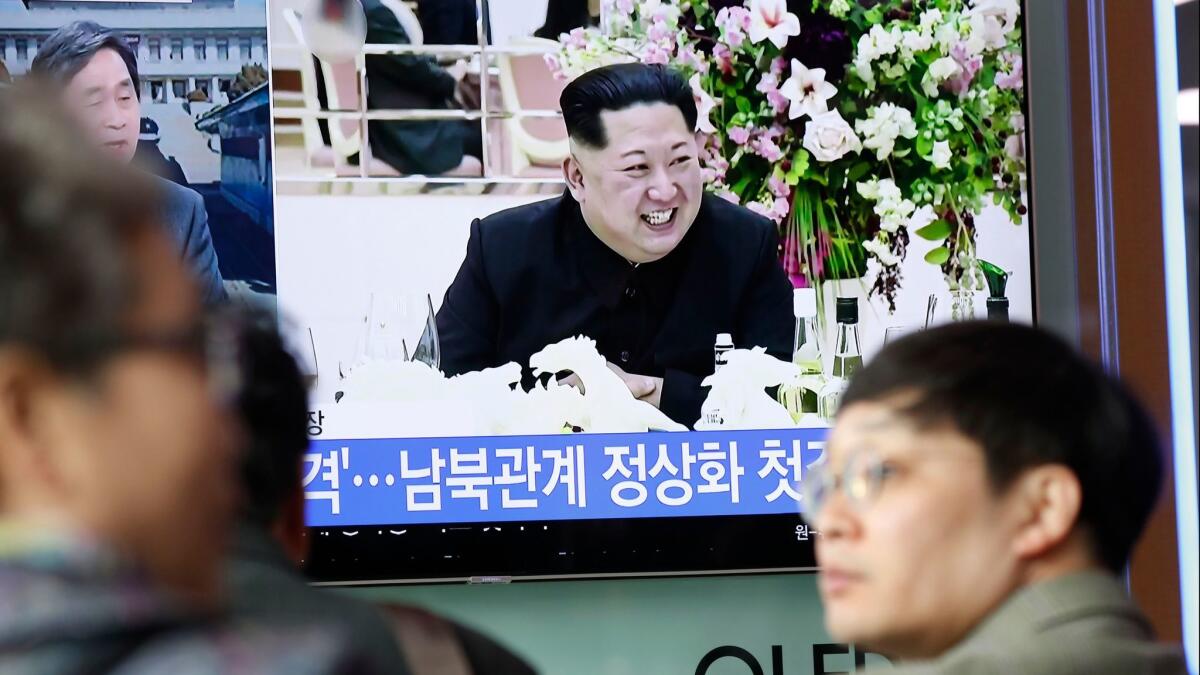Editorial: Real hope for peace in North Korea, or just a chimera?

- Share via
South Korea’s announcement that North Korea is willing to engage in negotiations that could lead to the dismantling of its nuclear weapons program is perhaps the ultimate example of the flippant internet expression “big if true.” Optimism about the possibility of a breakthrough obviously must be restrained — “tempered” is too mild a term — by the North’s recent provocations and its history of mendacity.
Even so, the United States should react positively to this overture, assuming that North Korea confirms the details. South Korean officials reported the offer after meeting in the North Korean capital, Pyongyang, with top leaders from the North, including Kim Jong Un.
“The North Korean side clearly stated its willingness to denuclearize,” the South Korean statement said. “It made it clear that it would have no reason to keep nuclear weapons if the military threat to the North was eliminated and its security guaranteed.”
Furthermore, according to the statement, the North was willing not to engage in “strategic provocations, such as nuclear and ballistic missile tests,” while negotiating with the United States. That seems like a response to a suggestion last year by Secretary of State Rex Tillerson that “the best signal that North Korea could give us that they’re prepared to talk would be to stop these missile launches.”
If the South Koreans are accurately representing what they were told in Pyongyang, North Korea has shifted its position dramatically, though questions remain. For starters, what does the North mean by the elimination of a military threat to that country? Would that include an end to joint U.S.-South Korean military maneuvers or even the withdrawal of U.S. forces from the South?
The Trump administration’s initial reaction to this startling development has been commendably cautious, but clearly the administration is intrigued. On Tuesday morning President Trump tweeted: “Possible progress being made in talks with North Korea. For the first time in many years, a serious effort is being made by all parties concerned…. May be false hope, but the U.S. is ready to go hard in either direction!”
At a news conference later in the day, he indicated that he thought the North Koreans were sincere, but also attributed their possible willingness to talk to the effect of increasingly severe economic sanctions. That is a likelier explanation than Trump’s ill-considered threats to rain “fire and fury” on the North.
The administration is in no rush to articulate a new policy, but it’s taking the reports of a change in Pyongyang’s position seriously and plans to confer with America’s South Korean allies, who have boldly sought reconciliation with the North, most recently at the Olympics. We’re not sure if that’s what Trump meant by “going hard” in the cause of peace, but it’s a policy we can support.
Follow the Opinion section on Twitter @latimesopinion and Facebook
More to Read
A cure for the common opinion
Get thought-provoking perspectives with our weekly newsletter.
You may occasionally receive promotional content from the Los Angeles Times.






